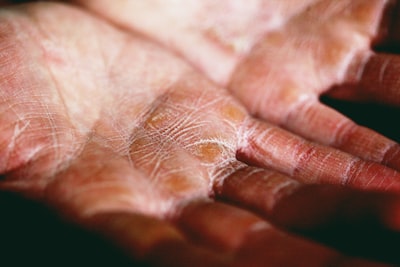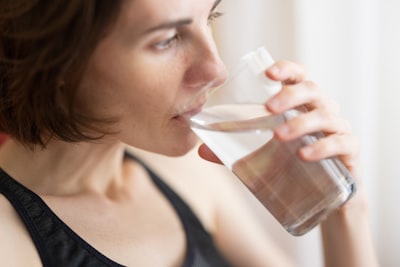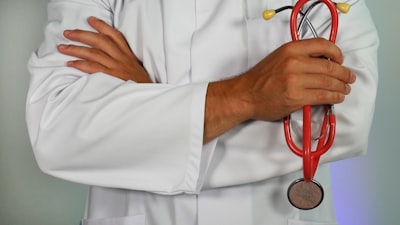Uncovering Unusual Signs of Dehydration
Dehydration is a common condition that affects many people, but did you know that there are some lesser-known signals of dehydration that could sneak up on you? In today's post, we're going to explore 10 unusual signs of dehydration and provide a visual guide to help you identify them so that you can decide whether or not a proven IV drink solution is right for you. From dry or flushed skin to persistent headaches, we will cover all the symptoms you need to look out for. We will also delve into the causes of dehydration, how it can be diagnosed, and the quick remedies and long-term solutions available for treatment. Lastly, we will share some tips on how to prevent dehydration from occurring in the first place so that you can stay hydrated and healthy. Don't wait until it's too late - read on to learn more about this important topic.
Understanding Dehydration - An Overview
Dehydration occurs when the body loses more water than it takes in. Common symptoms of dehydration include dry mouth, dizziness, and increased heart rate. The human body normally contains a lot of water, which helps keep it healthy and working well. Mild dehydration can cause problems with blood pressure, heart rate, and body temperature. Severe dehydration can also cause weakness or confusion. In extreme cases, it can lead to brain damage and even death. Severe dehydration is a life-threatening condition that requires immediate medical attention. Risk factors for dehydration include hot weather, excessive sweating, and certain medical conditions. Staying hydrated is crucial for maintaining proper bodily functions. It's important to recognize dehydration symptoms and seek medical help if needed. Remember, dehydration is a serious condition that should not be taken lightly.
What is Dehydration?
Dehydration occurs when the body lacks enough fluids to function properly. Common symptoms of dehydration include thirst, dry skin, and dark-colored urine. In adults and children, symptoms of dehydration may also include feeling thirsty, peeing less often than usual, feeling dizzy or lightheaded, feeling tired, having a dry mouth, lips, and tongue, and having sunken eyes. Signs of dehydration in a baby may include [Usage Example]. Severe dehydration can lead to complications like low blood pressure and seizures. It's important to drink enough water and fluids to prevent dehydration, especially for older adults and those with chronic illnesses.
Unusual Signs of Dehydration
Dehydration can manifest in various peculiar signs beyond the typical symptoms. These may include dry or flushed skin, indicating a lack of hydration. Bad breath could be a potential sign due to reduced saliva production. Frequent muscle cramps might be linked to electrolyte imbalances caused by dehydration. Additionally, food cravings, especially for sweets, can subtly indicate dehydration.
1. Dry or Flushed Skin as a Symptom of Dehydration
Dry or flushed skin can be an unusual sign of dehydration. Insufficient water intake leads to a lack of moisture in the skin, affecting its ability to regulate body temperature. Preventing dry or flushed skin requires maintaining proper hydration. Paying attention to skin changes is crucial for identifying dehydration.
2. Bad Breath - A Possible Sign of Dehydration
Bad breath can be an unusual sign of dehydration as it is often linked to reduced saliva production. When the body is dehydrated, it produces less saliva, which can contribute to oral health issues and lead to bad breath. To address this, it is important to stay hydrated by increasing water intake and practicing proper oral hygiene. Monitoring oral symptoms can provide valuable insights into hydration levels.
3. Frequent Muscle Cramps - Are They Linked to Dehydration?
Frequent muscle cramps can be a sign of dehydration. When you're dehydrated, your electrolyte balance can be disrupted, leading to muscle spasms. To prevent muscle cramps, make sure you stay adequately hydrated and replenish your electrolytes. If you experience persistent or severe muscle cramps, it's important to seek medical advice.
4. Food Cravings, Particularly for Sweets - Could it be Dehydration?
Food cravings, especially for sugary treats, can be a sign of dehydration. When the body is dehydrated, it may struggle to regulate hunger and thirst signals, leading to cravings for unhealthy foods. Drinking water or consuming hydrating foods can help alleviate these cravings and promote proper hydration. Paying attention to food cravings can provide insight into your hydration needs.
5. Experiencing Fever and Chills? It Might be Dehydration!
Experiencing fever and chills could indicate dehydration. When the body lacks adequate hydration, it can struggle to regulate temperature properly. Pay attention to changes in body temperature in relation to your hydration status, and seek medical attention if fever or chills persist or worsen.
6. Persistent Headaches as a Dehydration Warning
Persistent headaches can be a warning sign of dehydration. When the body lacks sufficient fluid, it can lead to reduced blood volume, which in turn affects brain function and causes headaches. Proper hydration is key in preventing and alleviating headaches. If you experience severe or recurrent headaches, it's important to seek medical advice for proper evaluation and treatment. Remember, staying hydrated is crucial for overall well-being. An easy way to ensure you stay hydrated and potentially ease your headache is by drinking a full glass of water and continuing to sip more fluids during the day, as MedlinePlus points out.
7. Rapid Heartbeat and Breathing - Are You Dehydrated?
Rapid heartbeat and breathing can be signs of dehydration. Dehydration affects the balance of electrolytes and blood volume, impacting heart function. Rehydrating with fluids can help restore a normal heart rate and respiratory pattern. Monitor changes in heart rate and breathing in relation to hydration status, seeking medical attention if symptoms persist or worsen.
8. Excessive Fatigue - An Unusual Sign of Dehydration
Feeling exhausted and drained, even after a good night's sleep, can be an indication of dehydration. When the body lacks proper hydration, energy levels plummet, leading to excessive fatigue. Dehydration interferes with the transportation of oxygen and nutrients in the body, further contributing to feelings of tiredness. Don't overlook fatigue as a symptom of dehydration; it could be the underlying cause if you're feeling unusually tired.
9. Sunken or Dry Eyes - Could it be Dehydration?
Dryness and a sunken appearance of the eyes may indicate dehydration. Reduced tear production and lack of fluid intake can lead to dryness in the eyes. If your eyes feel dry and appear sunken, it could be a sign of dehydration.
10. A White Tongue - Is it a Sign of Dehydration?
If you notice a white coating or patches on your tongue, it could be a sign of dehydration. Dehydration reduces saliva production, leading to a dry mouth and the formation of a white coating on the tongue. Pay attention to changes in your tongue's appearance as it may indicate dehydration.
Causes of Dehydration
Inadequate fluid intake is a common cause of dehydration. Excessive sweating from physical activity or hot weather can lead to dehydration. Diarrhea and vomiting, including severe diarrhea, can cause rapid loss of fluids and electrolytes. Certain medications, such as diuretics, can increase urine production and contribute to dehydration. Illnesses that cause excessive fluid loss, like gastroenteritis, can result in dehydration.
Common Factors Leading to Dehydration
Several common factors can contribute to dehydration:
- Intense exercise and excessive sweating increase the risk of fluid loss.
- Hot weather and high temperatures also cause fluid loss through sweat.
- Fever and elevated body temperature increase fluid needs.
- Chronic illnesses like diabetes and kidney disease impair fluid retention.
- Older adults, due to decreased thirst perception and kidney function, are more prone to dehydration.
How Can Dehydration be Diagnosed?
Recognizing the symptoms and seeking medical help are key in diagnosing dehydration. Increased thirst, dry mouth, and dark urine, including decreased urination, are common signs. Medical professionals may conduct physical exams and urine tests to assess dehydration levels. Severe cases may require treatment in the emergency room, while diagnosis also involves evaluating fluid imbalance and electrolyte levels.
Recognizing the Symptoms and Seeking Medical Help
Don't rely on thirst alone to gauge dehydration; urine color can be telling. Dry mouth and throat, along with fatigue, dizziness, and confusion, can also signal dehydration. Muscle cramps and headaches may occur too. If you experience these symptoms, including nausea, seeking medical help is crucial. A healthcare provider can evaluate your condition and recommend oral rehydration solutions or other appropriate treatments. Remember, recognizing the signs of dehydration and taking action can prevent further complications.
Treatment for Dehydration - Quick Remedies and Long-Term Solutions
Treatment for dehydration involves quick remedies and long-term solutions. Quick remedies include drinking water and consuming sports drinks to replenish electrolytes. To prevent dehydration in the long term, it is important to maintain a regular intake of fluids throughout the day. This can be achieved by drinking enough water and avoiding excessive caffeine consumption. It's also crucial to manage underlying medical conditions and incorporate hydrating practices into daily routines to maintain optimal hydration levels. In severe cases, where dehydration becomes a medical emergency, immediate treatment with IV fluids in a hospital is necessary.
Steps to Cure Dehydration Rapidly
To cure dehydration rapidly, it is important to recognize the signs like dry mouth, fatigue, and dark urine. Increase fluid intake by drinking water and electrolyte-filled drinks. Include foods with high water content in your diet. Avoid caffeine and alcohol. Seek medical attention if symptoms persist or worsen.
Prevention of Dehydration
Staying hydrated is essential to prevent dehydration. Make sure to drink enough water throughout the day and consume hydrating foods like fruits, vegetables, and herbal teas. Be mindful of fluid intake during physical activity, especially in hot weather. It's also important to identify and manage any underlying health conditions that may increase the risk of dehydration. Educate yourself and others about the importance of hydration to prevent dehydration-related complications. One way to make sure you’re properly hydrated is to keep track of how much fluid you drink. If it’s clear, pale or straw-colored, it’s OK. If it’s darker than that, keep drinking.
Tips to Stay Hydrated and Avoid Dehydration
Staying hydrated is crucial for your overall health and wellbeing. To avoid dehydration, it's important to recognize the unusual signs such as bad breath, dry mouth, and dark pee. Calculate your daily water intake based on factors like age, gender, and activity level. Stay hydrated throughout the day by carrying a water bottle, drinking water before meals, and eating hydrating foods like watermelon, strawberries, and leafy greens. If you experience severe dehydration symptoms or are unsure, seek medical attention immediately. Remember, prevention is the flip side of dehydration, so make staying hydrated a priority.
Dehydration Prognosis - What does the Future Hold?
The prognosis for dehydration is generally positive if it is detected early and treated promptly. However, severe or prolonged dehydration can result in serious complications, including organ damage or even death. Preventing dehydration by staying hydrated and seeking medical attention when experiencing symptoms is crucial.
Can Regular Hydration Keep Chronic Illnesses at Bay?
Regular hydration plays a crucial role in preventing chronic illnesses. It can help avoid conditions like kidney stones and urinary tract infections while improving digestion, boosting immunity, and aiding weight management. However, it's important to note that regular hydration alone cannot prevent all chronic illnesses. Seeking medical attention and following a proper treatment plan is essential for managing any chronic illness.
Frequently Asked Questions
What does a dehydration headache feel like?
A dehydration headache can be described as a dull or throbbing pain, usually felt on both sides of the head. It may worsen with movement or physical activity. Other symptoms like thirst and dry mouth often accompany these headaches. Rehydrating yourself is the best way to alleviate a dehydration headache.
What are the early signs of dehydration?
Early signs of dehydration include feeling thirsty, having a dry mouth and tongue, dark yellow urine, and experiencing fatigue and dizziness. Recognizing these signs can help prevent further dehydration. Stay hydrated by drinking plenty of fluids throughout the day.
How much water should I drink in a day?
To determine how much water you should drink in a day, consider factors such as weight, activity level, and climate. A general guideline is to consume eight 8-ounce glasses of water daily. Adjust your intake based on physical activity and thirst signals.
Does drinking coffee or alcohol contribute to dehydration?
Drinking coffee or alcohol can contribute to dehydration. These beverages act as diuretics, increasing urine output and decreasing hydration levels in the body. To prevent dehydration, it is recommended to limit consumption of coffee and alcohol and drink water or other hydrating fluids instead.
What are some non-obvious signs of dehydration that people often overlook?
Some non-obvious signs of dehydration that are often overlooked include decreased urine output or darker urine, dry mouth and chapped lips, headaches, dizziness, fatigue, muscle cramps, and dry skin. It's important to pay attention to these symptoms as they can indicate a need for increased hydration.
Conclusion
In conclusion, it is crucial to recognize the signs of dehydration, as they may not always be obvious. Dry or flushed skin, bad breath, frequent muscle cramps, food cravings, and even persistent headaches can all be indicators of dehydration. It is essential to stay hydrated by drinking enough water and consuming hydrating foods and beverages. By taking steps to prevent dehydration, such as maintaining a healthy fluid intake and recognizing the signs and symptoms, you can protect your overall health and well-being. Remember to listen to your body and prioritize hydration to avoid potential complications. Stay healthy and hydrated!
DISCLAIMER: THIS WEBSITE DOES NOT PROVIDE MEDICAL ADVICE
The information, including but not limited to, text, graphics, images and other material contained on this website are for informational purposes only. No material on this site is intended to be a substitute for professional medical advice, diagnosis or treatment. Always seek the advice of your physician or other qualified health care provider with any questions you may have regarding a medical condition or treatment and before undertaking a new health care regimen, and never disregard professional medical advice or delay in seeking it because of something you have read on this website.






